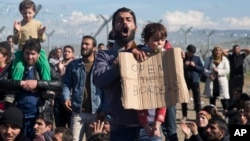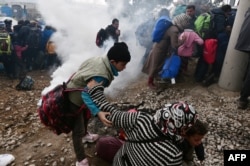On the Greek side of the border with Macedonia on Monday, refugees and other migrants tried to break through a border fence as anger boiled over at barriers impeding their access. Police in Macedonia fired tear gas hoping to keep the throngs of people out of the country.
As the unrest among refugees fleeing the Middle East spreads along European borders, a shaky cease-fire that began on Saturday has reduced the level of violence in Syria; but, until major power players in the region figure out how to overcome mutually exclusive positions, battles will continue to flare and the refugee crisis will continue to deepen, according to analysts.
And with the approach of spring weather, the crisis will worsen, according to Yan St. Pierre of Berlin-based security group, Mosecon.
“That is everybody’s fear,” he said, adding, “that once the weather becomes milder, that there will be a much larger influx of refugees and certainly more attempts to cross over into Europe.”
All sides have accused their enemies of violating the terms of the cease-fire, but the United Nations says the relative calm may allow them to deliver emergency aid to 150,000 people this week.
French Foreign Minister Jean-Marc Ayrault warned on Monday that reports of continued airstrikes could threaten the cease-fire. “France has therefore demanded that the task force charged with overseeing the cessation of hostilities meet without delay," he said.
End in sight?
Actually ending the war will require rival powers, including Saudi Arabia and Iran and their respective allies, to negotiate deals on issues on which they take opposing, hard-line views, according to Khaled Almaeena, a veteran Saudi journalist and former editor-in-chief of Saudi Gazette.
For example, he said, Saudi Arabia will accept no future for Syria that includes President Bashar al-Assad, a staunch Iran ally who has vowed to retake all of Syria.
“I think we are politically mature enough that there has to be a transition period,” he added. “If Assad goes, then who will fill in the vacuum?”
He said negotiating peace in Syria is a seemingly impossible task that cannot be completed quickly.
The current cease-fire may contribute to the peace process, according to St. Pierre, but it also may give some groups of fighters the chance to regroup and prepare for long-term battle.
Additionally, militant groups like Islamic State and al-Nusra Front are not part of the peace talks or the cease-fire and vow to continue the violence, despite any international agreements.
Continued U.S. coalition and Russian attacks on Islamic State militants are contributing to the refugee crisis, as families flee U.S.-led coalition and Russian airstrikes in addition to the ground war, said St. Pierre.
“The more they keep bombing,” he said, “the more refugees they produce.”







